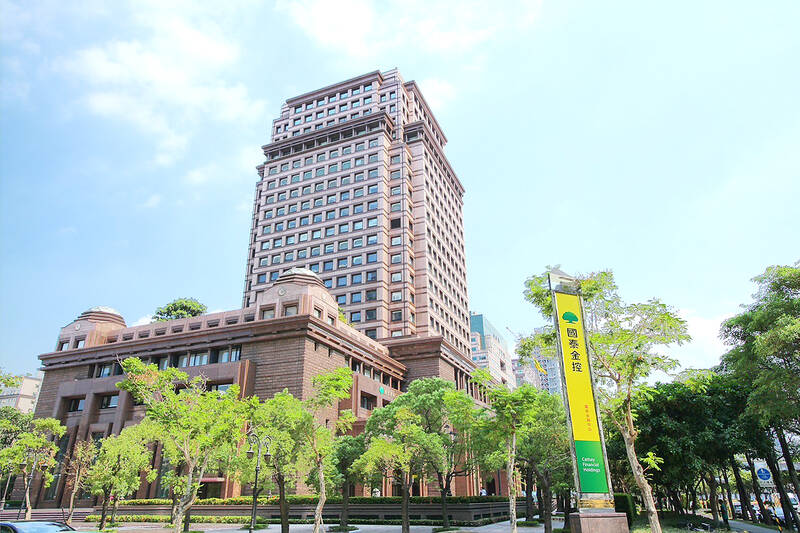Cathay United Bank (國泰世華銀行), a long-standing advocate for energy transition, was crowned Best Bank for Sustainable Finance at the ESG Investing Awards by Global Markets Media.
The Bank outperformed prominent global contenders such as Morgan Stanley, TD Bank Group and the Bank of Nova Scotia to be named the winner — the only Asian enterprise to claim such a title.
As the top sustainable finance brand in Taiwan, Cathay United Bank bases its energy transition policy on the low-carbon economic blueprint and the environmental sustainability blueprint — covering Scope 1 to 3 emissions and the use of renewable energy — fully supporting Earth Day’s 2025 theme of “Our Power, Our Planet.”

Photo courtesy of Cathay United Bank
In addition to being the first in Taiwan’s financial sector to complete the energy transition of its head office in 2022, the bank has been paving the way toward sustainability, providing financial solutions to all customers and stakeholders in pursuit of net zero carbon emissions.
Cathay United Bank said that instead of viewing sustainable transition as a risk, it should be regarded as a positive force that drives business growth and transformation, while enhancing the risk resilience of businesses.
The bank introduced several innovations during its commitment to sustainable development, such as promoting internal carbon pricing for internal energy transition and empowering employees to engage in their companies’ transition through sustainability performance-linked payroll services.
With many companies inspired, the bank is increasingly focused on transition strategies in its planning, aiming to create mutually beneficial long-term value for stakeholders.
To share its experience and explore sustainable transition solutions with its partners, Cathay United Bank has established diverse collaboration models.
For example, the bank teamed up with the CDP, an international nonprofit that helps companies disclose their environmental impact, to assist customers in understanding the importance of net zero emissions and impact management.
Last year, thanks to the efforts of experts and the bank’s staff, 121 among 150 companies invited by the bank obtained CDP scores, with the response rate of the CDP questionnaire exceeding 80 percent — high above the global supply chain’s average of 50 percent.
The bank also held forums and workshops with reputed organizations to share knowledge on achieving sustainable transition.
Cathay United Bank also engaged with the Metal Industries Research and Development Center, Taiwan’s first carbon footprint verification agency, to accelerate its net zero transition by offering businesses transition technologies.
The bank has also created engagement models tailored to customers’ industry type, business scale, carbon emission levels, and environmental, social and governance development progress, aiming to enhance customers’ ability to implement net zero transition.
At the same time, Cathay United Bank continues to provide sustainability-linked loans, green deposits, sustainability performance-linked payroll services, and sustainable finance partnerships with small and medium-sized enterprises. By offering technical and capital support, the bank assists customers in achieving their sustainability goals.
Aside from achieving PAS 2060 certification for its head office and three green branches last year, Cathay United Bank further exemplified its role as a “green” landlord by signing a Corporate Power Purchase Agreement. The agreement offers lessees with the option of renewable energy and marks another step toward sustainability.
Looking ahead, the bank remains committed to the idea of “Our Power, Our Planet,” and aspires to wield its influence to bring together employees, customers and stakeholders in the pursuit of net zero emissions — building a sustainable tomorrow.

Application-specific integrated circuit designer Faraday Technology Corp (智原) yesterday said that although revenue this quarter would decline 30 percent from last quarter, it retained its full-year forecast of revenue growth of 100 percent. The company attributed the quarterly drop to a slowdown in customers’ production of chips using Faraday’s advanced packaging technology. The company is still confident about its revenue growth this year, given its strong “design-win” — or the projects it won to help customers design their chips, Faraday president Steve Wang (王國雍) told an online earnings conference. “The design-win this year is better than we expected. We believe we will win

Intel Corp chief executive officer Lip-Bu Tan (陳立武) is expected to meet with Taiwanese suppliers next month in conjunction with the opening of the Computex Taipei trade show, supply chain sources said on Monday. The visit, the first for Tan to Taiwan since assuming his new post last month, would be aimed at enhancing Intel’s ties with suppliers in Taiwan as he attempts to help turn around the struggling US chipmaker, the sources said. Tan is to hold a banquet to celebrate Intel’s 40-year presence in Taiwan before Computex opens on May 20 and invite dozens of Taiwanese suppliers to exchange views

Chizuko Kimura has become the first female sushi chef in the world to win a Michelin star, fulfilling a promise she made to her dying husband to continue his legacy. The 54-year-old Japanese chef regained the Michelin star her late husband, Shunei Kimura, won three years ago for their Sushi Shunei restaurant in Paris. For Shunei Kimura, the star was a dream come true. However, the joy was short-lived. He died from cancer just three months later in June 2022. He was 65. The following year, the restaurant in the heart of Montmartre lost its star rating. Chizuko Kimura insisted that the new star is still down

While China’s leaders use their economic and political might to fight US President Donald Trump’s trade war “to the end,” its army of social media soldiers are embarking on a more humorous campaign online. Trump’s tariff blitz has seen Washington and Beijing impose eye-watering duties on imports from the other, fanning a standoff between the economic superpowers that has sparked global recession fears and sent markets into a tailspin. Trump says his policy is a response to years of being “ripped off” by other countries and aims to bring manufacturing to the US, forcing companies to employ US workers. However, China’s online warriors